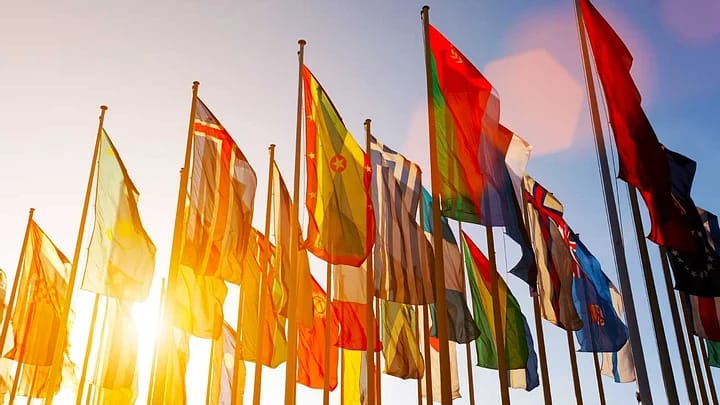
Foreign Policy Imperatives During COVID-19

Countries the world over need to come together in times of crisis|Photo credit: University of London
The year 2020 may go down in history as the “Annus Horribilis” as Queen Elizabeth called a year of calamity to the British royalty.
In such a year, there is only one imperative, not only for foreign policy or any other policy, but for humanity itself - survival.
We do not know yet the final tally of the loss of lives, chronic illnesses, the economic collapse and the demographic changes that COVID-19 will leave behind and when. All plans and policies we make for the post-COVID-19 world may be miserably wrong, whether for the better or worse.
With survival as the imperative, foreign policy of any country today should become non-ideological, non-political, global and all inclusive. Medicines, equipment, food, relief materials and vaccine should be available to the needy without any consideration for the strength of the nations or their financial situation. Unprecedented international cooperation is necessary much more than before.
There should be a moratorium on disputes and a ceasefire, lifting of sanctions and deployment of the armed forces for health keeping operations. There should be a “war for peace” where there shall be no victor or vanquished.
In fact, I had proposed in an op-ed article in ‘The Hindu’ that the UN should constitute a force on the lines of its peace-keeping operations, the new “red berets” in place of the “blue berets.” It may not be too late to do that even now as the worst may yet to be.
What we saw in the last six months was exactly the opposite of what should have happened. 2020 was the year everything became political. Even the most non-political of acts, wearing a mask, became political.
2020 was a year in which we saw police violence, mass protests, climate change-fuelled fires in the west, hurricanes in the Gulf, and now a Supreme Court fight to replace one of the most important justices that will ever sit on the court.
“Amidst a litany of world changing issues we face, some people not only refuse to wear masks, they flaunt it to the point of being outwardly abusive,” wrote my son, Sree Sreenivasan, Marshall R Loeb professor at Stony Brook University School of Journalism in New York.
At the multilateral level, the most important imperative is to transform the UN into an effective body, capable of dealing with COVID-19 and its aftermath.
Its failure to deal with the biggest threat to international security was a shame and it is not surprising that many are looking for alternatives rather than reforming it.
In the end, the wisdom that prevails will be that it would be better to carry on with an established enterprise rather than build a new one at tremendous cost and effort. For India, reform of the UN means an expansion of the Security Council with India as a permanent member with veto. Since that is not in the realm of possibility, we should think of innovative reforms that will dilute the veto or make it less frequent.
The General Assembly could be made more powerful by shifting some of the important agenda items to the Plenary and making its resolutions mandatory. Strengthening multilateralism with devolution of power to the General Assembly might be the way to go. Not overstating our wish for a permanent membership of the Security Council will generally enhance our credibility as a troop contributor and a champion of nuclear disarmament.
PM Modi did well to speak generally about reform in his video address to the high-level meeting of the General Assembly to commemorate the 75th anniversary of the United Nations. "We cannot fight today's challenges with outdated structures… Without comprehensive reforms, the UN faces a crisis of confidence," he said. "For today's interconnected world, we need a reformed multilateralism that reflects today's realities, gives voice to all stakeholders, addresses contemporary challenges and focuses on human welfare," he added.
However, the message which came out of the commemorative session was that it would be business as usual. “We reiterate our call for reforms of three of the principal organs of the United Nations. We commit to instil new life in the discussions on the reform of the Security Council and continue the work to revitalise the General Assembly and strengthen the Economic and Social Council," said the declaration. Such words have been used many times before.
The Chinese moves on our border were the least expected side effect of COVID-19. We had expected that China would be on the defensive and work quietly to make up with the world and behave in a responsible manner even if it had expected that the US would leave a vacuum in a post-COVID-19 world, which it could fill. The flexing of muscles by China in Hong Kong, Taiwan, South China Sea and elsewhere was thought of in the long term, once they had emerged from the COVID-19 mess, but not in the middle of it.
Teaching India a lesson is an obsession with China, but India had not done anything to counter their ambition for world dominance. Realignment of the Line of Actual Control (LAC) was not important or urgent for them. The only plausible reason for the latest lesson it delivered was the Indian actions in Jammu & Kashmir and Ladakh.
The imperative for developing a new China policy added to the woes of India, already weakened by poor economic performance and terrorist attacks from Pakistan. India’s three-pronged policy of dialogue, readying for war and economic measures did not work, but the occupation of certain posts on the south of Pangong Tso made the Chinese realise that India meant business this time. China was quick to set up a dialogue, which resulted in a five-point agreement in Moscow on September 10.
But the cautious words of the Defence Minister in Parliament and the long silence for two weeks may be the proverbial lull before the storm, which might go out of control and a new policy towards China might become more imperative. The commander level talks are progressing with the participation of a Ministry of External Affairs officer, but India is apparently insisting on Chinese withdrawal first before India does.
If the status quo of April is fully restored, India’s withdrawal from its new positions may be acceptable to India. In a positive development, the two sides agreed “to avoid misunderstandings and misjudgements, stop sending more troops to the frontline, refrain from unilaterally changing the situation on the ground, and avoid taking any actions that may complicate the situation.” This was stated in a joint statement after the sixth round of talks between senior military commanders on September 21, 2020.
The Chinese actions have reset India-US relations at a higher level, without India having to make any concession to the US in exchange for its support. India can wait for the US elections and act in accordance with the new situation without having to take any initiative till then. Neither Trump nor Biden will do any harm to India in the new dispensation in the world. A Biden-Harris Presidency may be more predictable and steady. The revival of the quadrilateral forced on us by China has also strengthened our relations with Japan and Australia.
Rattled as it was by the disastrous impact of COVID-19 and with the remaining issues relating to Brexit, Europe may be busy with itself in the coming days. By hosting India-China talks in Moscow, Russia may have helped the process, but it is inclined to remain neutral between India and China.
As for bilateral relations, Russia will be a reliable partner in the fight against COVID-19. Solid support of France evidenced by the induction of Rafale aircraft and Germany’s problems with China are reasons for hope in our developing good relations with Europe in the post-COVID-19 world.
The imperative for regional cooperation in South Asia has been accentuated by COVID-19 as well as Chinese actions. Pakistan may come to a SAARC meeting on COVID-19, but it is likely to speak on Kashmir to spoil the party.
The other countries may be grateful for what India can do, particularly for making a vaccine available first. Positive vibrations come from Sri Lanka and Maldives, but Nepal is unrepentant about their cartographic aggression against India.
Bangladesh demands attention while Afghanistan may become volatile if the Americans withdraw. The invitation from the US to be part of the Afghan talks is a double-edged weapon, given the linkages of Taliban with Pakistan and its past hostility to India. The Chinese activities will cast a shadow on South Asia.
(This column is based on a talk given by the author at the State Bank Institute of Leadership, Kolkata on ‘India’s Foreign Policy Imperatives in the Fast Changing World’.)
